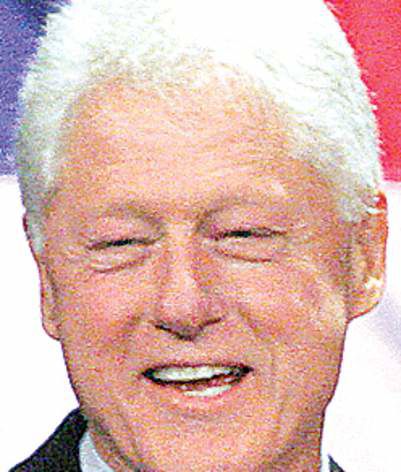Being a former president: That, too, has benefits
Published 4:00 am Wednesday, November 19, 2008

- George W. Bush and his wife are planning memoirs — while Bill Clinton has virtually made a business out of being a former chief executive.
CHICAGO — When Barack Obama and his family move into 1600 Pennsylvania Ave. in January, they won’t exactly be living on a pauper’s salary, $400,000. The real money, though, could come when they move out.
No matter what kind of president Obama turns out to be, the Illinois Democrat can almost certainly count on a post-presidential lifetime of steady and probably huge earnings from books, speeches, corporate boards and other events that have made multimillionaires of modern day Oval Office retirees.
This could be called “presidential economics,” a big-money game in which chief executives — popular, mediocre or disgraced — cash in after they leave office.
That’s not to say there are no perks — two jumbo jets, a fleet of helicopters and limos, and a presidential retreat — but not everything is covered by an expense account. All expenses such as clothing and food are personal, with the exception of $100,000 that is given each term for decoration of the residence and the Oval Office, according to White House assistant press secretary Carlton Carroll.
The first family also can set up an outside fund through the White House Historical Association to help cover additional costs. Travel and health care is covered, though not with a specific amount, he said. But using the White House medical unit, or an appointed civilian doctor, if the president chooses, does not come with a charge, and prescriptions also do not cost the First Family anything.
Even as Obama prepares to become the nation’s 44th president, his income is already jumping. Two books he wrote — “Dreams From My Father” and “The Audacity of Hope” — are soaring this week on the best-seller lists.
First lady Laura Bush is reportedly planning a memoir that is generating great interest in the publishing industry. President George W. Bush said this week he will “probably” write a book, although his prospects are not as promising as his wife’s.
In modern times this is a stunning turn of events. After Harry Truman left the White House in 1953, his only income was his pension from the Missouri National Guard. According to Michael Devine, director of the Truman Library and Museum in Independence, Mo., when Truman was asked by a local bank to sit on the board of directors, the former president said no and asked “Where were you guys 30 years ago when I needed a loan?”
Since then, change has certainly come to the lives of Truman’s successors.
Former President Bill Clinton left office in 2001 deep in debt from impeachment-related legal expenses, but he wrote a book and commanded huge speaking fees to pull himself out of a financial hole. His speeches range from $100,000 to $250,000 apiece. Clinton’s book “My Life” earned a $15 million advance, and Hillary Clinton’s “Living History” drew an $8 million advance.
They followed the footsteps of other former presidents. Richard Nixon, the only president to resign from office, wrote books and granted interviews for cash. Ronald Reagan played to his strength, hitting the speaking circuit. Jimmy Carter wrote books.
Obama’s post-presidential value is potentially greater for several reasons. He’s already a published and accomplished author; he made history by becoming the first African-American elected president; and his speaking skills and rock star/celebrity status predate his move into the White House.
Although Obama will likely make more money when he leaves the White House, he should have few concerns going in.
The book deal from Random House gave Obama a $1.9 million advance in January 2005 for writing two nonfiction books and one children’s book, according to his 2005 Senate ethics statement.
On the campaign trail, the Obamas often presented themselves as not far removed from debt before his best-selling books began to swell their bank account during his first year in the Senate. As young lawyers, the couple pursued nonprofit or public service jobs during much of the 1990s.
Public records paint only part of the financial picture. In 1993, they bought a condominium in Hyde Park for $277,500, paying about $111,000 as a down payment, according to county real estate records.
As for income, they earned a combined household total of slightly more than $240,000 in 2000, according to tax records they have since made public.
Their income fluctuated in that range until 2005, when they reported earning $1.6 million. In 2006, they reported income of $991,296, before seeing it jump to $4.2 million in 2007, the most recent year available.






